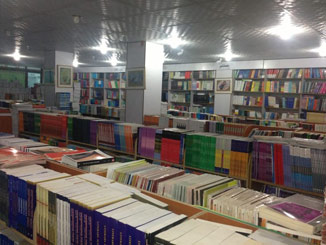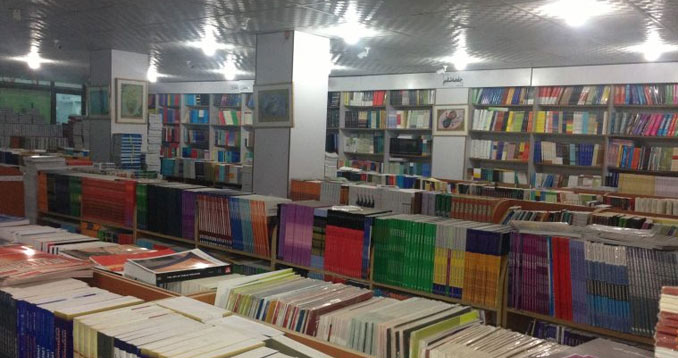

Hasht-E Subh Yesterday, the Taliban collected thousands of book volumes from bookstores and publishing centers in the city of Kabul, and this process continues. Intelligence from this group has warned publishers and booksellers that anyone objecting to this decision will face imprisonment. Reliable sources have informed the Hasht-e Subh Daily that the Taliban have gathered over 20,000 book volumes in the field of ethnic history, especially books written about national leaders, Shia sect, and materials published regarding “Jihad and the resistance of the people of Afghanistan” from the city’s bookstores, collecting them entirely. The Taliban intelligence has warned publishers that this matter should not become a media issue. According to the group’s warning, publishers have been threatened that if they make this matter public, the Taliban will imprison them.
Credible sources confirm to the Hasht-e Subh Daily that the Taliban collected thousands of book volumes from bookstores and book publishers in the city of Kabul yesterday and took them with them. At least two reliable sources have confirmed that these books have been collected by the Taliban intelligence.
An informed source, reluctant to disclose their identity due to security threats from the Taliban, reveals that the militants of this group collected all history books, especially those related to Tajik history, Shia sect, and ethnic leaders, yesterday. The source adds, “They have gathered all publishers’ books related to history, Shia sects, Tajik history, books related to Jihad and resistance of the people of Afghanistan, books related to previous leaders such as Ahmad Shah Massoud, Abdul Ali Mazari, and others, as well as books related to the history of ethnic groups in Afghanistan.”
Another credible source confirms this, stating, “Explaining this is dangerous because they [the Taliban] have threatened that no media should report it.” This source, also choosing anonymity for similar reasons, adds, “They have collected around 11,000 volumes from Saeed Publications, approximately 10,000 from Amiri Publications, and thousands more from Maqsoudi Publications, Vazha Publications, and others.”
The source mentions that after collecting these books, the Taliban have threatened publishers, asserting that no one has the right to object, and the punishment for dissent is imprisonment. According to the source, “They threatened that no one has the right to object; otherwise, we are waiting for them in prison.”
An informed source states, “For the past two weeks, there were reports that the Taliban intended to inspect bookstores. A team from the Ministry of Information and Culture, a team from Taliban intelligence, and a team from their media department visited bookstores, thoroughly checked publishers’ warehouses, and seized whatever books they desired from each bookstore and publisher. They have collected a significant number of books, and the process of collecting books by this group has not concluded yet.”
Meanwhile, Dr. Mujib-ur-Rahman Rahimi, a writer and spokesperson for the High Council for National Reconciliation of the former government, has reported on his X account (formerly Twitter) about the confiscation and prohibition of his books by the Taliban. Mr. Rahimi writes, “The Taliban have confiscated and banned my books. Through a chain of policies, including censorship, deletion, monopolization, restriction of freedom of expression, curriculum changes, madrasa construction, creating a monolithic society, and Talibanization of the country, the Taliban have confiscated the books ‘The Chronicles of the Official Discourse of the Formation of the Government in Afghanistan,’ ‘A Critique of the System Structure,’ ‘Ahmad Shah Massoud; Martyr of Peace and Freedom,’ and ‘Religion, Government, and Sharia Adaptation’ from some publications and bookstores in Kabul. They have summoned publishers and bookstores, taking written commitments from them not to market these books.”
According to Mr. Rahimi, he possesses documents indicating that Taliban intelligence forces have raided publishing centers and bookstores in Kabul, seizing and taking away bookstore stocks in the fields of history, identity, religious enlightenment, and so on, and books by specific authors based on a provided list.
Nevertheless, Keshawarz (pseudonym), one of the analysts surviving under the Taliban’s rule, tells the Hasht-e Subh Daily, “History of the Taliban, with a resounding voice, expresses enmity towards civilization and culture. Despite that, there was a perspective suggesting that the Taliban had learned from the past and were moderating their previous primitive behaviors to a significant extent. However, the severe censorship imposed on book publishing and the pressures imposed on publishers in Afghanistan indicates that this group has not only failed to become more moderate but is intensifying its extremist behaviors day by day.”
Mr. Keshawarz adds that the Taliban’s intelligence leadership and the Ministry of Propagation of Virtue and Prevention of Vice are present in all aspects of people’s lives, making everyday life more bitter than yesterday. This analyst emphasizes, “The Taliban forcibly seized power through deception and commitments with the United States. Hence, they are highly apprehensive about the free flow of information and awareness and fear books, literacy, and knowledge. The Taliban have largely taken control of Afghanistan’s social media networks through the mobilization of their cyber army and now seek to shut down the publishing and book sector by imposing severe censorship.”
Taliban intelligence is currently extensively collecting historical records, especially those related to ethnic history. Previously, the Ministry of Higher Education of the group had also issued orders for the purging of books from university libraries and educational institutions.
Taliban officials have instructed all universities in the country to purge their libraries of books from the Republic era and replace them with the book “Siraat” (Biography of the Prophet of Islam).
A version of the ministry’s letter, previously accessible to the Hasht-e Subh Daily, indicates that it mentions Salafis, Tahrirs, Shiites, and political opponents of the Republic era in the context of the purged books. The acting head of the Taliban Ministry of Higher Education has ordered that the book list be shared with him before the purging process.
It is noteworthy that over the past two years, the Taliban have consistently demonstrated their commitment to media censorship, raids on bookstores, and the confiscation of thousands of books, revealing their disbelief in the tangible realities and diverse society of Afghanistan. They consider anything incompatible with their ideological framework as expendable and reject it outright.
